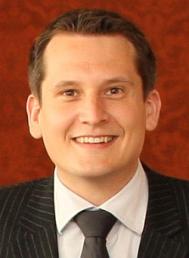22 December 2010
Discussions with Victims of Nazi Persecution at the Faculty of Social Sciences
The Institute of International Studies of the Faculty of Social Sciences and the Living Memory for Students non-profit have been organizing meetings with witnesses of Nazi persecution. The originator of this idea is Dr. Vít Fojtek from the Department of American Studies.
When a how did you get the idea to organize these discussions?
It happened three years ago. I was riding the tram, and from the window I saw Colonel Jan Wiener (who unfortunately died on November 24, 2010), walking down the street, fast and straight up even in his old age. That reminded me of his extraordinary lectures that I went to when I studied at the Faculty of Arts. Back then, a couple of years after the Velvet Revolution, I – and most of the other students taking the class – admired his courage and his respect to moral values, according to which he, unlike many others, actually acted and lived.
|
|
Even though fifteen years have passed since I went to his lectures, I was reminded of this extraordinary person who has maintained great physical and mental condition and was always in good mood, even after all those obstacles the fate had put in his way: like his dramatic escape from a concentration camp, the death of his father, the death of his mother, deaths of most his family in the concentration camp Auschwitz, imprisonment and torture in Italy, escape to Great Britain via Africa, service at the 311th bomber fleet of the Royal Air Force, his arrest after the war and five years of work in the mines of the communist work camp in Kladno, life in exile. I decided to invite him for a discussion with students and screen the documentary The Fighter directed by the Israeli filmmaker Amir Bar-Lev, which received many awards at international festivals. The event was met with great response from students, teachers and Colonel Wiener himself. |
Then I spent some time working away from the university and only managed to continue organizing the meetings a few years after. Recent installments were only possible with the help of Living Memory, a non-profit that maintains an extensive database of witnesses of Nazi persecution and provides funding and administrative work for the meetings. The organization was founded in 2003, in the process of processing compensations to the Czech victims of the Nazi terror. It wasn’t an entirely new idea, but a continuation of the previous undertakings of the Czech-German Future Fund, whose Department for the Victims of Nazi Regime has processed over 120,000 requests for compensation. During this process, a unique database of witnesses, their personal and official documents, photographs and personal recollections was created. Members of the department then founded the Living Memory organization to maintain this database.
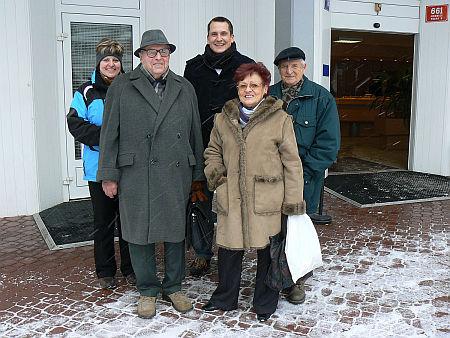 From the left: Kateřina Šírková, René Šírek, Božena Roubíčková and Česlav Roubíček, behind them Vít Fojtek, Ph.D.
From the left: Kateřina Šírková, René Šírek, Božena Roubíčková and Česlav Roubíček, behind them Vít Fojtek, Ph.D.
How many meetings have there already been and at what students are they targeted? Who has already taken part?
The discussions are intended for students of Bachelor’s, Master’s and doctoral degrees, and also for teachers interested. Invitations are being published on the faculty’s website, sent to students’ email addresses, put up on bulletin boards at the faculty and advertised on Facebook. Last year, the faculty hosted Dr. Jiří Zapletal, a direct witness and participant of the student demonstrations of November 17, 1939, who was arrested in December 1939 and interned in the Sachsenhausen concentration camp near Berlin. This year, Dr. Petr Šafařík’s History of Central Europe seminar welcomed two forced labourers, Dr. René Šírek and Mr. Česlav Roubíček, who worked in the German anti-aircraft defense system, the so-called Luftschutz, during the bombardment of the seaports of Kiel and Hamburg. The two of them are, besides a long-lasting friendship, connected by a number of coincidences: They were both born in 1923, went to grammar schools in Prague and graduated in 1942 – René Šírek on the day of the Heydrich assassination, Česlav Roubíček on the day of the Lidice massacre. These events naturally had direct impact on their lives. Just a few months after their graduation, they were enlisted to do forced labour in Germany.
René Šírek described his work in the North German ports as follows: “Working here was physically demanding and dangerous, we were removing the rubble after air-raids and searching for and deactivating mines.” His worst experience from this period was the confrontation with the deaths of civilians and the fear for his own life during air-raids and demining. On the other hand, he found new friends. After returning to Bohemia in 1943, he was again sent to labour at the anti-aircraft defense in Prague-Ruzyně. Later, he was arrested and spent three weeks in jail due to a conflict with a Czech collaborationist organization. Česlav Roubíček, for example, participated in the fight for the train station in Praha-Vršovice during the Prague uprising in May 1945.
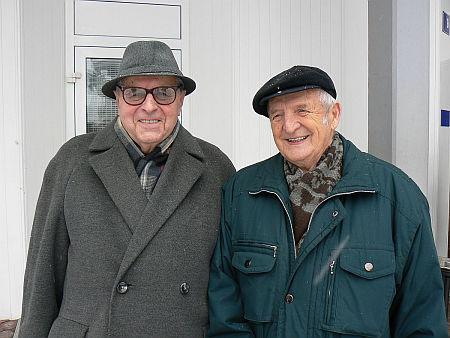
JUDr. René Šírek (left) and Česlav Roubíček
When will next meetings happen? How do you choose your guests?
I’m trying to look for witnesses with interesting life stories, and if possible, victims of different kinds of Nazi persecution. Another factor is the witness’ experience of public talking and their willingness to share their experiences, most of which they would often rather completely forget. Many of them have told their stories at both Czech and German high schools and universities and other institutions. On the other hand, if I come across a witness who has not yet told his story, I try to convince him or her to share it with our students. It is of course a unique and often unfortunately one of the last chances to do that – as most of the witnesses are approaching ninety.
At the beginning of the summer semester of 2011, we are planning a meeting with Mrs. Marta Kottová, a holocaust victim, who survived, among other things, four concentration camps: Theresienstadt, Auschwitz, Gross-Rosen and Mährensdorf. She is also the chairman of the historical association Auschwitz – in 2008, she was awarded with the Medal of Merit Second Grade for her service to the state in the field of education. Other discussions are in the works with more witnesses of the events of November 17, 1939, about whom Living History is now filming a documentary. There are many others – victims of the Holocaust, Roma Holocaust, political prisoners in concentration camps, forced labourers and others – and each of their stories is unique.
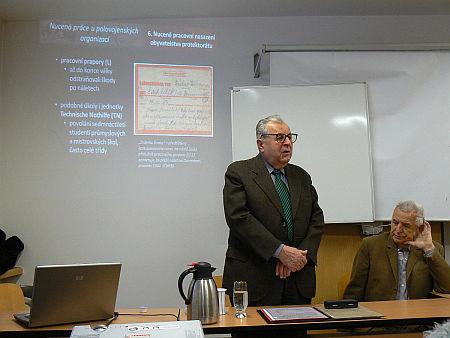
What has the feedback from students been like? What interests them the most?
Given that the meeting had only 80 minutes, there wasn’t much space for questions. Generally, students liked the lecture and appreciated the opportunity to listen to the stories of actual eyewitnesses. They were also interested in how both gentlemen experienced the key events in their lives emotionally and how they managed to deal with adversities.
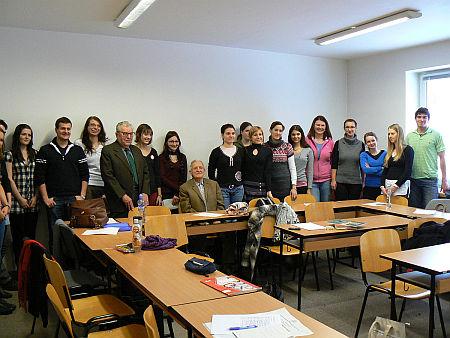
Selections from surveys handed out to students
Did you find the lecture interesting, and why?
Of course, it is an amazing experience to talk to somebody who experienced it all. You won’t find details like this in the books.
A student at the Institute of International Studies from Krásno (in the Karlovarský Region), 19 years old
Yes. The best and most reliable information about history can only be told by the people who experienced it. I appreciated and enjoyed the lecture. Thanks.
An undergraduate student at the Institute of International Studies Student from Prague, 19 years old
Absolutely! No documentaries can substitute live narration. Too bad there wasn’t more time, I could listen to these gentlemen for hours… Details and stories like this best describe the times in which they lived.
An undergraduate student at the Institute of International Studies Student from Trutnov, 20 years old
Yes, of course – getting the information first hand, hearing personal stories is much more interesting and moving than learning about it at school. Here, you can see that it’s not just numbers and empty information, but real people’s stories. Given that my granddad was a forced labourer during the war, but never told me what it was like, I am happy to have heard about it at least from someone else.”
An undergraduate student at the Institute of International Studies Student from Prague, 19 years old
Photos: Teresa Babková
(Lucie Kettnerová)
Translation: Jaroslav Švelch

